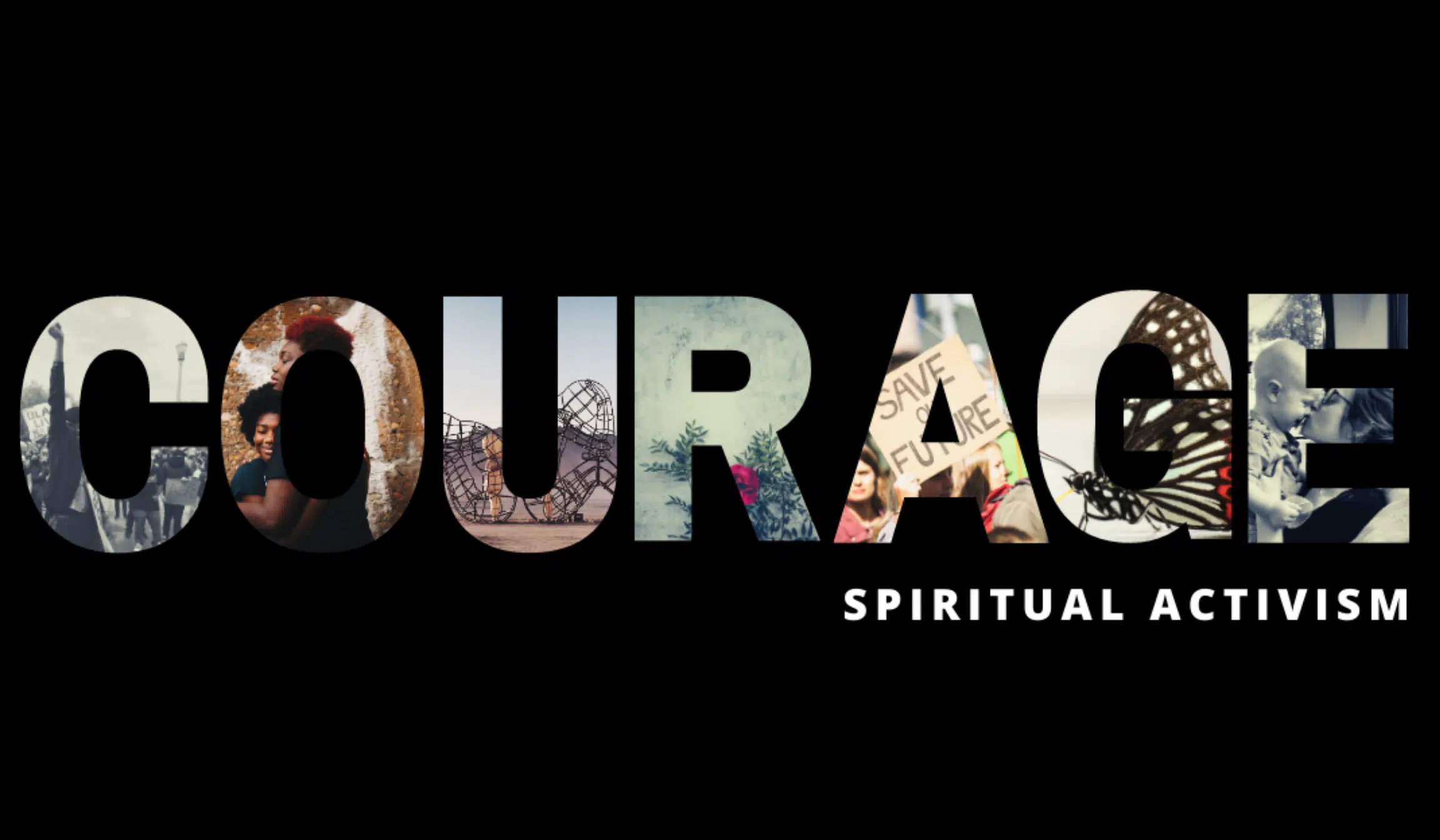“Even in the darkest of times we have the right to expect some illumination…from the uncertain, flickering, and often weak light that some men and women, in their lives and works, will kindle under almost all circumstances.”
Hannah Arendt
The United States has long buried its distortions and cruelties under more attractive sounding images. But we live in a time when our capacity for degradation has been allowed to enter the light of day. We look toward difficult times.
Hannah Arendt, the brilliant philosopher and Jewish refugee from National Socialism, reminds us that compassion – the egalitarian warmth for sufferers which is directed also toward evildoers – manifests itself especially during dark times (Men in Dark Times, 12-13).
The very darkness of the times evokes a sense of compassion and humanity, at the very time humanity is most under threat. It is a time that invites us to seek spiritual friends to help us to magnify the capacity for unrestrained compassion.
Sources of Compassion
One place to turn is the ancient wisdom of religion. Religions embody the traits of their practitioners and therefore much of the cruelty compassion aims to defeat. But religions are also unique in their dedication to practices of wisdom and compassion. This dedication makes them good conversation partners as we seek wisdom in our own dark times.
Christianity was born in a dark time and place. A rapacious empire had conquered the Jewish people. The economy had been redirected toward Rome’s coffers, leaving many people destitute. The cross became a too frequent exemplar of Roman power. Christianity’s great teacher died on one of these crosses, as did many of his followers. Slavery awaited others.
But many were drawn to this impotent and shabby “way.” It offered a luminous counter-narrative to the religion of Rome. These early followers could not accept what passed for piety in Roman religion. The cruelty of its practices and emptiness of its theology were impossible to accept. In the first century small groups of practitioners were inflamed by a simple precept: “whoever does not love does not know God for God is love” (I John 4:8).
Ancient Christians seem to have understood what we have forgotten: this simple precept is extraordinarily difficult. If we are to renounce the fear, hostility, anger, violence, addiction to entertainment, indifference to beauty and to suffering that so characterizes the logic of empires it is necessary to train – like an athlete trains – or a musician or cabinet maker.
The Didache was a first century manual teaching the “way of life.” It seems to have arisen in an ecumenical community of Jews and non-Jews following the teachings of Jesus. “Didache” refers to the training that a master craftsperson would provide for an apprentice. To follow the “way” was to participate in a teaching community with the earnest dedication of an apprentice mastering their craft.
The “way of life” is extremely simple: love God and neighbor. Love of neighbor is specified negatively: what you do not want to happen to you do not do to someone else. That is it. That is the whole “way.” But as simple as this is, it is also enormously difficult. The little book marks a path, training the mind in the path of love. Without prelude or warm-up the first training dives deeply into the heart of loving kindness (metta) practice: “speak well of the ones speaking badly of you and pray for your enemies and fast for the ones persecuting you. For what is the merit if you love the ones loving you? Do not even the gentiles do the same thing? You on the other hand, love the ones hating you and you will not have an enemy” (1:3).
The foundational spiritual training is to love those who harm you. In order to do this, a second training is introduced: “Abstain from fleshly and bodily desires” (1:4). Being familiar with a certain kind of Christian morality, I assumed this would involve a repudiation of sex. But for the author of the Didache it means that if someone hits you in the face, you turn to receive another blow; if a Roman soldier demands you carry his pack one mile, you carry it two. Bodily and fleshly desires are the fears and anger that naturally arise when one is persecuted, humiliated, and oppressed. To awaken the heart it is necessary to pray for those who hate you and to pacify fear and anger. In this way one no longer has any enemies. Everyone becomes a neighbor.
The Sustaining Soul-Force
Praying for enemies is first century “satyagraha:” the “soul force” that Gandhi invoked as the source of non-violent resistance. When one is faced with humiliation, interpersonal conflict, or grinding oppression it is natural to feel overwhelmed and victimized just as when a bull is charging you, it is natural to feel terror. But if you are a bull-fighter, a great soul-force is released when a bull charges. You become beautiful and your slight figure skillfully eludes the charge of the monstrous bull. In this ancient compassion training, those who are weak and helpless become a great soul-force. They are not destroyed by harsh treatment but become agents of transformation, bodhisattvas, for those who intend harm.
Rosemarie Freeney Harding describes something like this in her memoir, Remnants. In 1962 she co-founded the first inter-racial Mennonite house as part of the civil rights campaign in Atlanta, GA. While she and a co-worker, Marion King, were both pregnant, Marion visited jailed civil rights workers. On one visit, a guard kicked her so hard she fell down and miscarried. Rosemarie and other friends were shocked and angered. But when Marion returned from the hospital, walking slowly because of the pain “there was something in her face. A kind of light. Like a victory, a resplendence. It’s hard to explain because it wasn’t prideful and it wasn’t false. It helped to quiet us – our anger, our judgment. And we recognized it…It was something transcendent – capable of transforming us, our adversaries, and our entire society. Marion’s countenance and her conversation reminded us of that quality of the Movement…What I am trying to emphasize to you in this example is how deeply and how seriously many people were grappling with the meaning of nonviolence during the Movement days and how Marion’s reaction had a context and the support of a community of people who understood, or at least were trying to understand, the potential of compassion and non-violence to transform individuals and societies” (158).
De-Colonizing Our Minds and Awakening Our Hearts
The Didache suggests that the primary obstacles to this kind of spiritual athleticism are the emotions that arise as naturally as breath when we are faced with difficulty. Strong emotions are more like bodily responses than moral choices.
When a beloved co-worker is so egregiously harmed, emotions arise as spontaneously as the sweat on one’s brow or the thumping of one’s heart. But as long as we are ruled by these bodily responses of fear and anger, neither we ourselves nor the people we encounter can appear in the full poignancy of their humanity.
The examples of the Didache community and the memories of Rosemarie Harding show us that we can practice in ways that decolonize our minds and awaken our hearts to the beauty and suffering of others – all others. From a Christian perspective, we do this by dropping into the great compassion of the Beloved and allowing it to circulate through us. But we can do this also with the help of secular or religious meditation practices. We can do it by remembering to walk in beauty. We can do it in silence and with music. We will find communities and spiritual friends that hold us up, as Marion was held up and held others up.
Practicing Together
In these difficult times, it is necessary to remember that we practice together because compassion is difficult but we practice also because it is possible – “that our joy may be complete.” Rosemarie Harding suggested this exercise: “Think of someone who does not look like you, someone you don’t know and perhaps have preconceived notions about. Or someone you have strong disagreements with. Get a picture of that person, or someone who represents such a person in your mind, and put it someplace where you can see it before you go to sleep at night…I do this. I will look at that picture, perhaps a Klan member and say, You are my brother. You are my father. You are my son. God be with you and bless you. Or if you are a Buddhist, chant on the person’s behalf. And go to sleep with those thoughts and prayers on your mind. You’ll be amazed at the transformation – in us.” (Remnants 261).
May it be so.



